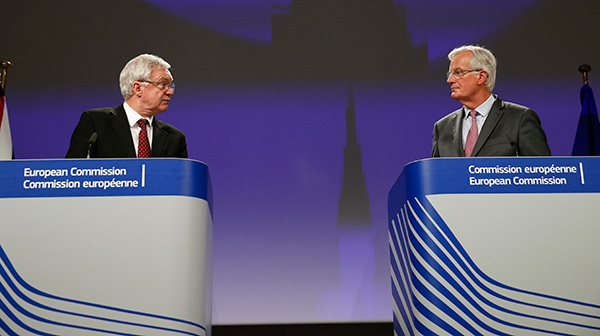Latest Brexit talks mark 'considerable progress' although in dribs and drabs
Xinhua | Updated: 2017-09-29 09:29
 |
Britain's Brexit Secretary David Davis (L) and European Union chief negotiator Michel Barnier attend a press conference at the end of the fourth round of Brexit talks at the EU Commission in Brussels, Belgium, Sept 28, 2017. [Photo/Xinhua] |
BRUSSELS -- The latest round of Brexit talks tried to work towards achieving concrete progress. Britain's Brexit Secretary David Davis told reporters here on Thursday that "considerable progress has been made in issues that matter."
The talks, the fourth round so far, came on the heels of British Prime Minister Theresa May's high-profile speech in the Italian city of Florence spelling out Britain's plans to leave the EU.
In her speech last week, May proposed a two-year transition period after Britain left the EU in March 2019. She also pledged that Britain would pay its "fair share" into the EU budget -- a hint that London would budge on the touchy issue of the Brexit "divorce bill."
EU chief negotiator Michel Barnier said Britain agreed to honor the withdrawal agreement, which "gives the assurance to EU citizens that they will be able to invoke their rights, as defined by the withdrawal agreement, before UK courts."
"We agreed to guarantee -- for the citizens concerned -- that the UK will apply EU law concepts in a manner that is consistent with EU law after Brexit," he stated.
However, that seemed to be the extent of progress achieved.
The two sides failed to agree over the role of the European Court of Justice (ECJ), which Barnier called a "stumbling block" for the EU.
In her speech, May promised to quit the EU single market and seek a free trade agreement with the EU. She also pledged to restrict access to Britain for EU citizens and end the jurisdiction of the European Court of Justice in Britain. The 12-point blueprint was dubbed a "hard Brexit."
But May's Brexit plan has long been dubbed as "cherry-picking" in Brussels and Strasbourg, where the jurisdiction of the European Court of Justice in Britain is taken as "indispensable."
Davis said both sides should be more imaginative on the issue.
"The United Kingdom thinks that in some cases we must go beyond the strict requirements of current EU law in order to protect citizens. For example, we have offered the European Union guaranteed rights of return for settled EU citizens in the UK, in return for onward movement rights for our UK nationals who currently live within the EU27," he said.
























